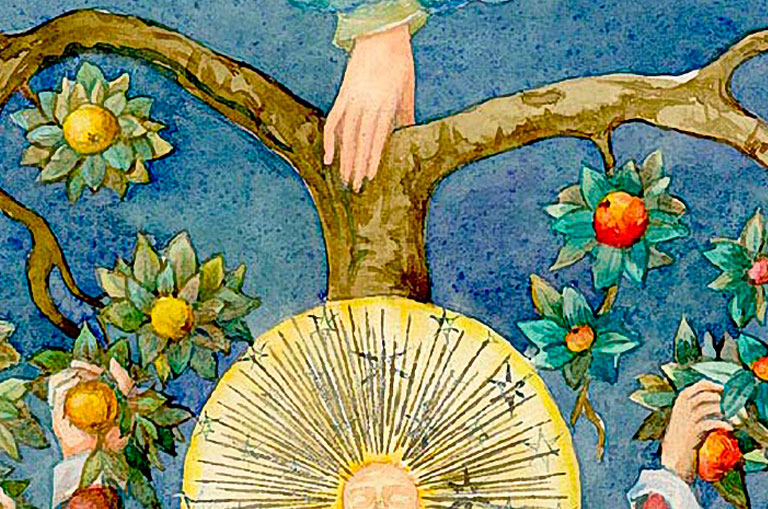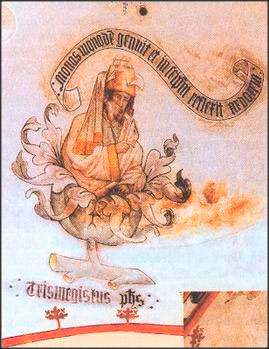Home » Hermetic Amsterdam

Historians of alchemy will be familiary with the name of the German-Dutch alchemist Johann Rudolf Glauber (1604-1670), who spent several decades in Amsterdam, building up his pharmaceutical business. The Dutch physician and alchemist Johann Friedrich Schweitzer or Sweitzer, who published under the name Helvetius (1630-1709), best known for his Vitulus Aureus (The Golden Calf, 1667) and his account of metallic transmutation, also spent time in Amsterdam. In the same period the anatomist and ‘chymical’ physician Theodor Kerckring (1638-1693) lived on the Keizersgracht, not far from the House with the Heads.
Many Hermetic, alchemical, mystical, kabbalistic printed works carry the name of Amsterdam in the imprint. The Portuguese rabbi and kabbalist Menasseh ben Israel (1604-1657) founded the first Hebrew printing press in Holland here in 1626, ten years after the establishment of the oldest functioning Jewish library in the world, the Ets Haim, which moved to the Portuguese Jewish Synagogue in 1675.
The proximity of a library of Hermetic Philosophy—the Bibliotheca Philosophia Hermetica (BPH), the creation of Amsterdam businessman Joost Ritman, who decided to make his collection of Hermetic and related books available to the public in 1984—was one of the reasons why a special chair of Hermetic Philosophy was established in Amsterdam. The BPH and the Centre for the History of Hermetic Philosophy have collaborated closely since 2012, when their partnership was formally sealed, resulting in a number of collaborative enterprises, notably the Infinite Fire Webinar series hosted by the BPH’s website. The presence of a Hermetic library and a Hermetic Chair make Amsterdam a unique city to pursue the study of Hermetic philosophy and related currents and makes the city stand out as the ‘Hermetic capital of the world.’ The BPH is located in the Embassy of the Free Mind at Keizersgracht 123, the renowned canal mansion “The House with the Heads.” It offers the opportunity to study the Hermetic tradition in the original home of seventeenth-century patrons of Hermetic and heretical freethinkers.

The Allard Pierson on Oude Turfmarkt hosts the special collections of the Amsterdam University Library. It houses the impressive material heritage of the University of Amsterdam and of the city itself, in addition to a longstanding collection of books and artefacts related to esotericism, magic, alchemy, kabbalah. Finally, Allard Pierson is home to the state-owned part of the famous Ritman Collection of Hermetic books and literature. The history of the institution goes back to 1575, as the City Library of Amsterdam. Today it comprises over a thousand sub-collections of rare books, manuscripts, early modern prints, photographs, letters, maps, and much more. Among its focus areas are the cultural history of the middle ages and the early modern period, church and religious history, Jewish cultural history, cartography, and the history of the book trade.
The Allard Pierson is more than just a research library, and frequently organizes exhibitions, lectures, and events that are open to the broader public.
Students of modern and contemporary esotericism will find the Amsterdam Theosophical Library an invaluable resource. Established in 1899, it is one of the oldest and most comprehensive occult libraries in the Netherlands. It holds about 25,000 books, and a large selection of occultist journals and periodicals. What the BPH does for early modern sources, the Theosophical Library does for esotericism of the nineteenth and twentieth centuries. The library is housed in the building of the National Headquarters of the Dutch section of the Theosophical Society, in Amsterdam’s De Pijp district.
A network of libraries, archives, museums, and institutes of higher education provides Amsterdam with the perfect infrastructure for studying Esotericism. Below are some useful links:
Faculty of Humanities, UvA, Bibliotheca Philosophica Hermetica, Special Collections, University Library, Amsterdam Theosophical Library, Amsterdam University Library (18 locations), Amsterdam Public Library (26 locations), Amsterdam City Archives, Vossius Collection, Leiden, Codices Vossiani Graeci et Miscellanei Online, Freemasonry Museum in the Hague concerning working on material in the Kloss Collection, Jewish Historical Museum, Comenius Museum, Naarden, Embassy of the Free Mind Online Catalogue
Visiting adress:
Bushuis/Oost-Indisch Huis
Kloveniersburgwal 48
1012 CX Amsterdam
The Netherlands
Postal adress:
Postbus 1622
1000BP Amsterdam
For all general information:
Ms. Antoinette Rutten (secretary)
The Center for History of Hermetic Philosophy and Related Currents (HHP) is part of the Faculty of Humanities at the University of Amsterdam. We are committed to the highest standards of critical academic scholarship, independent of any worldview.
Visiting adress:
Bushuis / Oost-Indisch Huis
Kloveniersburgwal 48
1012 CX Amsterdam
The Netherlands
Postal adress:
Postbus 1622
1000BP Amsterdam
Email: hermetica-fgw@uva.nl
The Center for History of Hermetic Philosophy and Related Currents (HHP) is part of the Faculty of Humanities at the University of Amsterdam. We are committed to the highest standards of critical academic scholarship, independent of any worldview.
Visiting adress:
Bushuis / Oost-Indisch Huis
Kloveniersburgwal 48
1012 CX Amsterdam
The Netherlands
Postal adress:
Postbus 1622
1000BP Amsterdam
Email: hermetica-fgw@uva.nl
The Centre for History of Hermetic Philosophy and Related Currents (HHP) is part of the Faculty of Humanities at the University of Amsterdam. We are committed to the highest standards of critical academic scholarship, independent of any worldview.
Visiting adress:
Bushuis / Oost-Indisch Huis
Kloveniersburgwal 48
1012 CX Amsterdam
The Netherlands
Postal adress:
Postbus 1622
1000BP Amsterdam
Email: hermetica-fgw@uva.nl
© HHP 2022 – by Digital Marketing Agency MIAX